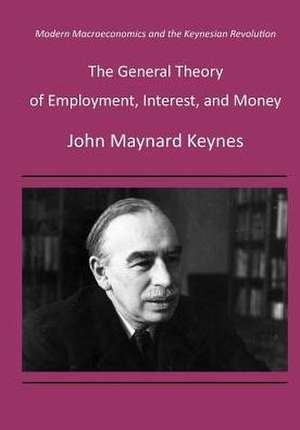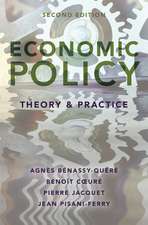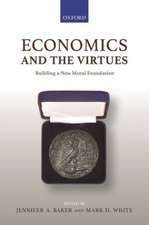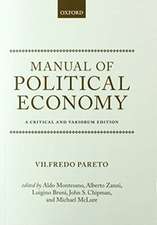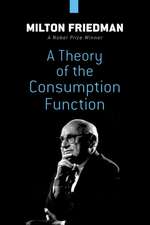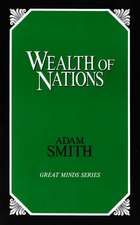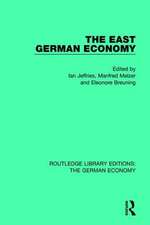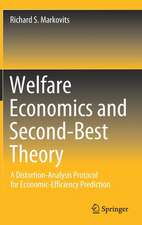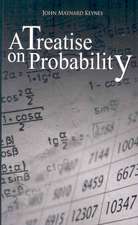The General Theory of Employment, Interest, and Money
Autor John Maynard Keynesen Limba Engleză Paperback
"Modern Macroeconomics and the Keynesian Revolution"
The General Theory of Employment, Interest, and Money
COMPLETE NEW EDITION - ILLUSTRATED
John Maynard Keynes
The General Theory of Employment, Interest and Money was written by the English economist John Maynard Keynes. The book, generally considered to be his magnum opus, is largely credited with creating the terminology and shape of modern macroeconomics. Published in February 1936, it sought to bring about a revolution, commonly referred to as the "Keynesian Revolution," in the way economists thought - especially in relation to the proposition that a market economy tends naturally to restore itself to full employment after temporary shocks. Regarded widely as the cornerstone of Keynesian thought, the book challenged the established classical economics and introduced important concepts such as the consumption function, the multiplier, the marginal efficiency of capital, the principle of effective demand and liquidity preference.
This book is chiefly addressed to my fellow economists. I hope that it will be intelligible to others. But its main purpose is to deal with difficult questions of theory, and only in the second place with the applications of this theory to practice. For if orthodox economics is at fault, the error is to be found not in the superstructure, which has been erected with great care for logical consistency, but in a lack of clearness and of generality in the pre misses. Thus I cannot achieve my object of persuading economists to re-examine critically certain of their basic assumptions except by a highly abstract argument and also by much controversy. I wish there could have been less of the latter. But I have thought it important, not only to explain my own point of view, but also to show in what respects it departs from the prevailing theory. Those, who are strongly wedded to what I shall call 'the classical theory', will fluctuate, I expect, between a belief that I am quite wrong and a belief that I am saying nothing new. It is for others to determine if either of these or the third alternative is right. My controversial passages are aimed at providing some material for an answer; and I must ask forgiveness If, in the pursuit of sharp distinctions, my controversy is itself too keen. I myself held with conviction for many years the theories which I now attack, and I am not, I think, ignorant of their strong points.
The matters at issue are of an importance which cannot be exaggerated. But, if my explanations are right, it is my fellow economists, not the general public, whom I must first convince. At this stage of the argument the general public, though welcome at the debate, are only eavesdroppers at an attempt by an economist to bring to an issue the deep divergences of opinion between fellow economists which have for the time being almost destroyed the practical influence of economic theory, and will, until they are resolved, continue to do so.
| Toate formatele și edițiile | Preț | Express |
|---|---|---|
| Paperback (6) | 58.22 lei 6-8 săpt. | +44.84 lei 10-14 zile |
| CreateSpace Independent Publishing Platform – | 99.24 lei 3-5 săpt. | |
| Prometheus Books – 30 apr 1997 | 103.99 lei 3-5 săpt. | +20.55 lei 10-14 zile |
| www.bnpublishing.com – 17 iul 2008 | 114.61 lei 3-5 săpt. | |
| stanfordpub.com – 31 oct 2016 | 149.10 lei 3-5 săpt. | |
| Springer International Publishing – 31 iul 2018 | 256.53 lei 3-5 săpt. | +28.56 lei 10-14 zile |
| Must Have Books – 28 feb 2021 | 58.22 lei 6-8 săpt. | +44.84 lei 10-14 zile |
Preț: 99.24 lei
Nou
18.99€ • 19.88$ • 15.81£
Carte disponibilă
Livrare economică 08-22 martie
Specificații
ISBN-10: 152295077X
Pagini: 282
Dimensiuni: 178 x 254 x 15 mm
Greutate: 0.49 kg
Editura: CreateSpace Independent Publishing Platform
Notă biografică
Descriere
In 1936 Keynes published the most provocative book written by any economist of his generation. Arguments about the book continued until his death in 1946 and still continue today. This new edition, published 70 years after the original, features a new introduction by Paul Krugman which discusses the significance and continued relevance of "The General Theory,"
Recenzii
Cuprins
Textul de pe ultima copertă
The General Theory of Employment, Interest and Money transformed economics and changed the face of modern macroeconomics. Keynes’ argument is based on the idea that the level of employment is not determined by the price of labour, but by the spending of money. It gave way to an entirely new approach where employment, inflation and the market economy are concerned.
Highly provocative at its time of publication, this book and Keynes’ theories continue to remain the subject of much support and praise, criticism and debate. Economists at any stage in their career will enjoy revisiting this treatise and observing the relevance of Keynes’ work in today’s contemporary climate.
